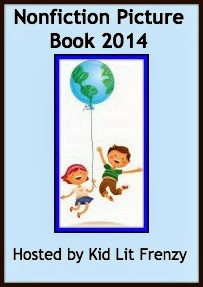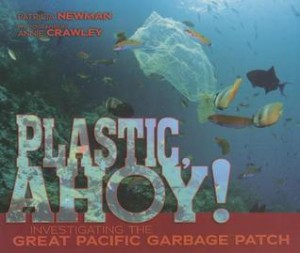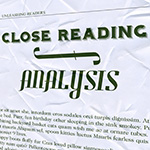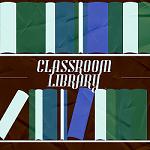Nonfiction Picture Book Wednesday
Nonfiction Picture Book Wednesday is hosted by Kid Lit Frenzy and was started to help promote the reading of nonfiction texts. Most Wednesdays, we will be participating and will review a nonfiction text (though it may not always be a picture book).
Be sure to visit Kid Lit Frenzy and see what other nonfiction books are shared this week!
Plastic, Ahoy! Investigating the Great Pacific Garbage Patch
Author: Patricia Newman
Photographer: Annie Crawley
Expected Publication April 1st, 2014 by Millbrook Press
Goodreads Summary: These scientists are on a mission. As part of a research expedition known as SEAPLEX, they’re studying the massive accumulation of plastic in the Pacific Ocean known as the Great Pacific Garbage Patch. As they use the scientific method to conduct their investigation, their adventures will introduce readers to the basics of ocean science and the hazards of plastics.
Kellee’s Review: At my school, I am an adviser of Future Problem Solvers which is a club that looks at futuristic issues and, by using the 6-step creative problem solving process, tries to come up with an action plan to solve the futuristic problems. One of our past competitions had the topic of “Ocean Soup,” and my students and I did research about the state of our ocean. It was at that time that I became aware of the Great Pacific Garbage Patch and was disgusted by it. I am so glad that this book exists now, because just like I didn’t know about the issue, my students didn’t either, until we began researching. This nonfiction picture book takes the reader through a mission with scientists to study the Great Pacific Garbage Patch and by making it a mission instead of just a book of facts will help engage readers in the problem that we are facing now.
Ricki’s Review: I was most impressed by the layout of this clever book. I loved how the design was fashioned to draw the reader’s eye to different portions of text. This will really capture kids’ attention. Young scientists will be sucked into this text, and the zoomed in pictures help readers unravel this mystery at sea along with these real-life explorers. The language and headlines made me smile–“Trash Talk: Nurdles and Triangles” and “Ocean Science: Munching Microbes.” Students in the upper elementary and middle school grades will find much to study in this fascinating text.
Teachers’ Tool for Navigation: This book would be an interesting addition to an environmental unit (or Earth Day activity) to look at how humans affect the Earth. It has a lot of information about why the Garbage Patch is happening and what humans could do to stop it–all information that would fit right in with any discussion about the environment. The book would also be a great resource whenever talking about being a scientist, the type of work they do, and the type of equipment they use. The book was very informative about all of these things as it followed the scientists on their mission. The author also has a curriculum guide you can access here.
Book Trailer:
Discussion Questions: What is the explorers’ mission? What do you find interesting about their jobs?; Why is the Great Pacific Garbage Patch happening?; What do humans need to do to diminish the amount of damage we are causing the Earth?
We Flagged: “The SEAPLEX Trash Detectives found plastic in 130 of their 132 net tows over 1,700 miles of open ocean. That’s the same distance as between New York City and Denver, Colorado. ‘To see plastic debris in the middle of this large stretch of ocean, far from land,’ Chelsea said, ‘offers a wake-up call for the way we leave our footprint even on remote pieces of the Earth.'” (p. 36)
Read This If You Loved: Let’s Make a Difference (series) by Gabriella Francine, The Lorax by Dr. Seuss, Island by Jason Chin, Giant Squid by Mary M. Cerullo, Can We Save the Tiger? by Martin Jenkins
Recommended For:
**Thank you to Barbara Fisch at Blue Slip Media for providing us with copies for review**






I really want to get a hold of this book. Thanks for sharing the video. Such an important thing to be sharing with students. I highlighted a number of ocean themed books on my #nfpb2014 post today. The importance of taking care of our waters cannot be stressed enough.
Carrie,
It is a very fun book. The text features are great. With each page turn, there are so many places to look. I agree that taking care of our waters is so, so important.
Love how our posts overlapped a bit 🙂
It looks so good and informative. I’ve been on two sailing trips with students and we were in the open Atlantic on one, saw quite a bit of trash floating by, even an office chair! We charted it, and tried to catch some of it. There was a clear protocol as to how to handle the boat’s garbage/trash/recyclables, etc. They said many just don’t bother-outrageous! Thanks so much for sharing!
Linda,
That is so disheartening. It is such a shame when people disrespect our environment. I bet your students (and you) learned so much on that trip!
On a positive note: What an awesome experience for you and your students!
Thanks for letting us know about this book. We just ordered it!
You are very welcome!
You are going to love it in your classrooms!